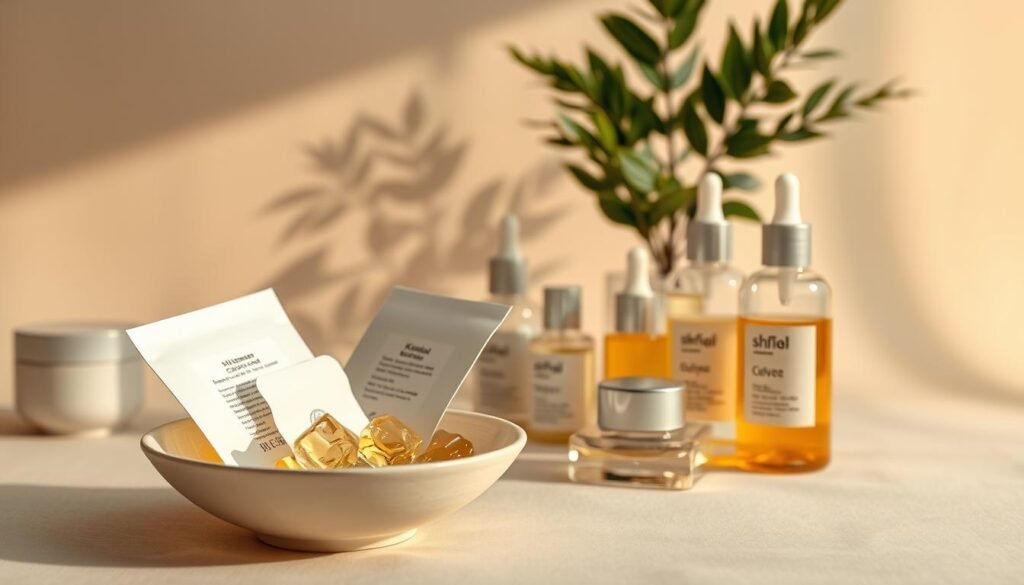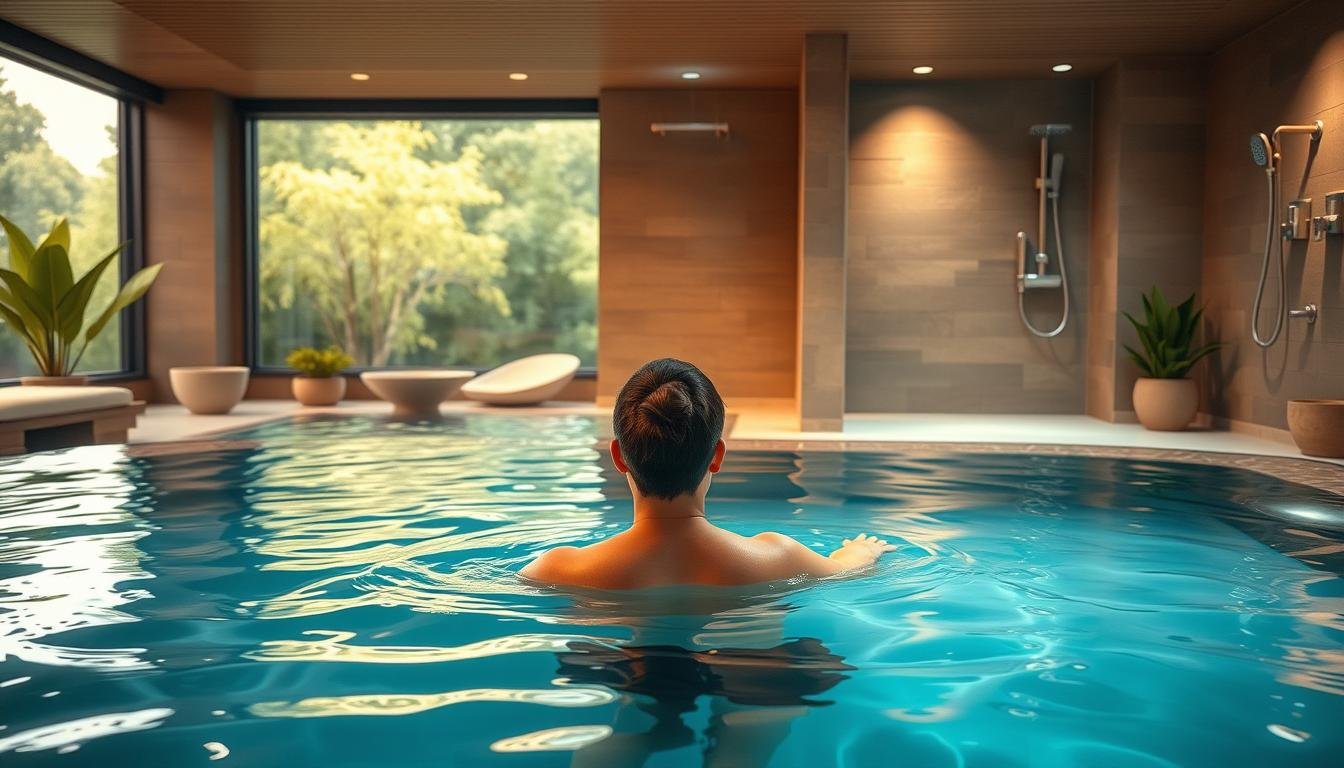The connection between mental and skin health is growing clearer. Stress and emotional well-being greatly affect our skin’s health and look.
Stress messes with our body’s balance, causing skin problems like acne and dryness. A good healthy skincare routine helps, but we must also tackle mental health issues.
Understanding the link between our mind and skin helps us achieve better skin health. We need to mix skincare tips with stress relief and a balanced life.
Key Takeaways
- Mental health significantly impacts skin health.
- Stress can lead to various skin issues.
- A healthy skincare routine is crucial.
- Addressing mental health is key to achieving healthy skin.
- Combining skincare with stress management is beneficial.
Understanding the Mind-Skin Connection
The link between our mental and skin health is complex. It’s influenced by stress, emotions, and hormonal changes. Our body’s response to these can show up as skin problems.
The Science Behind Stress and Skin
Stress makes our body release hormones like cortisol. This can cause more oil and inflammation in our skin. This can lead to acne, psoriasis, and eczema. Managing stress well is key to avoid these skin issues.
A study in the Journal of Clinical and Aesthetic Dermatology shows stress worsens skin conditions. It points to the need for skincare that includes stress relief.
| Stress Level | Skin Impact | Potential Conditions |
|---|---|---|
| Low | Minimal impact | Occasional breakouts |
| Moderate | Noticeable inflammation | Acne, mild psoriasis |
| High | Significant inflammation | Severe acne, eczema, psoriasis flare-ups |
Emotions and Their Effects on Complexion
Feeling anxious or sad can change how our skin looks. For example, anxiety might make us pick at our skin, causing damage. This can lead to conditions like dermatillomania.
Using mindfulness and self-care can help manage these feelings. It can also help our skin stay healthy.
Hormones: The Hidden Influencers
Hormonal changes affect our skin a lot. Changes in estrogen and testosterone can alter skin hydration, elasticity, and oil production. Knowing how hormones impact our skin is important for good skin health.
For instance, menopause’s drop in estrogen can dry out our skin. Fluctuations in testosterone can cause acne. Keeping hormones balanced through lifestyle changes and medical help when needed is crucial for healthy skin.
The Impact of Stress on Skin Health
Understanding stress’s impact on skin is key to glowing skin. Stress can show up on our skin in many ways. It affects not just how we look but also our overall health.
Common Skin Issues Linked to Stress
Stress makes our body release hormones like cortisol. This can cause several skin problems. Some common issues include:
- Acne: Stress can make our skin produce more sebum, clogging pores and causing acne.
- Eczema: Stress can make eczema symptoms worse, leading to inflammation and itchiness.
- Rosacea: Stress can trigger rosacea flare-ups, causing redness and irritation.
Knowing these connections is the first step to managing stress-related skin issues. By choosing the right skincare routine, we can lessen stress’s negative effects on our skin.
Tips for Managing Stress Effectively
Managing stress is crucial for healthy skin. Here are some effective ways to do so:
- Meditation and mindfulness can help lower stress levels.
- Regular exercise can reduce stress and improve overall health.
- Eating a healthy diet full of fruits, vegetables, and whole grains supports skin health.
Choosing the best skincare products for your skin type is also important. For those with sensitive skin care needs, using gentle, fragrance-free products can help avoid irritation.
| Stress Management Technique | Benefits for Skin Health |
|---|---|
| Meditation and Mindfulness | Reduces stress hormones, promoting clearer skin |
| Regular Exercise | Improves circulation, reducing stress-related skin issues |
| Healthy Diet | Provides essential nutrients for skin health and resilience |
Recognizing the Signs of Stress on Your Skin
Being able to spot stress signs on your skin is important. Common signs include:
- Unexplained breakouts or flare-ups
- Increased sensitivity or redness
- Dull, lackluster complexion
By recognizing these signs early, you can adjust your skincare routine and stress management strategies.
The Role of Nutrition in Mental Health
Nutrition, mental health, and skin health are all connected. Eating well can greatly improve your mood and skin. A balanced diet gives your body the nutrients it needs for mental well-being and healthy skin.
Foods That Boost Mood and Skin Health
Adding certain foods to your diet can really help your mood and skin. Foods like salmon and walnuts, rich in omega-3 fatty acids, are great for your mental health. Berries and leafy greens, full of antioxidants, protect your skin from damage.
Here are some top foods for mood and skin health:
- Fatty fish like salmon, rich in omega-3 fatty acids
- Nuts and seeds, such as walnuts and chia seeds, high in antioxidants and healthy fats
- Fruits and vegetables, especially berries and leafy greens, packed with vitamins and antioxidants
- Whole grains, like brown rice and quinoa, providing sustained energy and fiber
Hydration: The Key to Radiant Skin
Drinking enough water is key for radiant skin. Water helps remove toxins and keeps your skin hydrated. Drinking enough water is one of the simplest yet most effective skincare tips.
Try to drink at least eight glasses of water a day. Eating hydrating foods like watermelon and cucumbers can also help. Avoid caffeinated and sugary drinks to keep your skin hydrated.
Supplements to Consider for Skin Vitality
Some supplements can also help with skin vitality. Probiotics are good for gut health, which is linked to skin health. Omega-3 supplements are also beneficial, especially if you don’t get enough from your diet.
Consider these supplements:
- Probiotics to support gut health
- Omega-3 fatty acids for their anti-inflammatory properties
- Vitamin D, essential for overall health and skin well-being
By eating well and using natural skincare practices, you can support your mental and skin health. Trying Korean skincare routines, known for their natural ingredients and hydration, can also offer valuable skincare tips.
Incorporating Mindfulness into Your Routine
Making mindfulness a daily habit can boost your mental clarity and skin glow. Activities like meditation, breathing exercises, and journaling lower stress. This is good for your mind and skin.
Mindfulness means being fully present and observing your thoughts without judgment. It can greatly reduce stress, which harms your skin. Adding mindfulness to your day can improve your overall health.
Meditation Techniques for a Clear Mind
Meditation is a strong tool for clear thinking. It can lessen stress and anxiety, making your skin clearer. Start by finding a quiet spot, sitting comfortably, and focusing on your breath.
- Start with short sessions, like 5-10 minutes, and increase as you get more comfortable.
- Guided meditation apps or videos can help you begin.
- Try to meditate every day to see the best results.
Breathing Exercises to Reduce Tension
Breathing exercises are great for lowering stress and relaxing. Deep, controlled breathing calms your mind and body, improving your skin. Try these breathing techniques daily:
- Diaphragmatic breathing: Expand your diaphragm instead of shallow chest breathing.
- 4-7-8 breathing: Breathe in for 4 seconds, hold for 7, and breathe out for 8.
Journaling for Mental Clarity
Journaling is a way to process emotions and reduce stress. Writing down your thoughts and feelings can clear your mind. Set aside a few minutes each day to write freely.
“The goal is not to change who you are, but to become more of who you are by being more present and aware.”
Here’s a look at how mindfulness can lower stress levels:
| Stress Indicator | Before Mindfulness | After Mindfulness |
|---|---|---|
| Cortisol Levels | High | Reduced |
| Anxiety | Frequent | Less Frequent |
| Skin Issues | Acne, Irritation | Improved Complexion |
Adding mindfulness to your daily life can greatly improve your mental health and skin. By meditating, practicing breathing exercises, and journaling, you can lower stress and enhance your skin’s clarity and glow.
Sleep: The Ultimate Skin Care Secret
Quality sleep is a key part of skincare. It helps with skin repair and regeneration. During sleep, the body works hard to improve skin health, like reducing inflammation and making more collagen.
Impact of Lack of Sleep on Skin
Not getting enough sleep can cause many skin problems. These include dark circles, dull skin, and more acne. When you don’t sleep well, your body gets stressed, leading to inflammation and worse acne.
Common skin problems associated with sleep deprivation include:
- Dark circles and puffiness due to poor circulation and fluid retention
- Dull skin resulting from reduced collagen production and skin regeneration
- Increased acne due to stress-induced hormonal imbalances
Improving Sleep for Better Skin
Getting better sleep can greatly improve your skin. It’s important to have a regular sleep schedule, a sleep-friendly environment, and avoid stimulants before bed.
Tips for improving sleep quality include:
- Maintaining a consistent sleep schedule to regulate the body’s internal clock
- Creating a relaxing bedtime routine to signal the body that it’s time to sleep
- Avoiding caffeine and electronic devices before bedtime to reduce stimulation
Establishing a Relaxing Bedtime Routine
A calming pre-sleep routine tells your body it’s time to rest. Activities like reading, meditation, or a warm bath can help you relax.
A relaxing bedtime routine might include:
- Meditation or deep breathing exercises to calm the mind
- A warm bath or shower to relax the muscles
- Reading a book or listening to soothing music to distract from the stresses of the day
The Benefits of Physical Activity
Physical activity is great for your health and skin. It boosts circulation, increases collagen, and lowers stress. All these help your skin look healthier and more vibrant.
Exercise and Its Positive Effects on Skin
Exercise is good for your skin in many ways. It improves blood flow, which feeds your skin cells. It also reduces stress, which can cause skin problems like acne and rosacea. Plus, it helps you sleep better, which is key for skin health.
Key benefits of exercise for skin health include:
- Increased blood flow and oxygenation
- Enhanced collagen production
- Reduced inflammation
- Improved stress management
- Better sleep quality
Finding the Right Workout for You
Finding a workout you like is important. It helps you stay consistent and enjoy the benefits. Whether it’s running, yoga, swimming, or weightlifting, choose what you enjoy most.
“Exercise is a celebration of what your body can do, not a punishment for what you ate.” – Unknown
Stress-Relief Activities That Promote Skincare
Some activities help your skin and overall well-being. Yoga and tai chi are great because they mix physical movement with mindfulness. They help reduce stress and promote relaxation.
| Activity | Benefits for Skin Health |
|---|---|
| Yoga | Reduces stress, improves circulation |
| Tai Chi | Enhances relaxation, improves balance |
| Swimming | Improves circulation, reduces inflammation |
Adding physical activity to your life can greatly benefit your skin. Choose activities you enjoy and that lower stress. This way, you’ll improve your health and skin’s appearance.

Building a Positive Skincare Routine
Creating a skincare routine that fits you is key to better skin. A good routine boosts your skin’s health and your mood.
The Power of Self-Care for Mental Well-being
Self-care is a big part of skincare. It improves your skin and helps you relax. Aaron Wohl, MD said, “Self-care is not selfish. It shows you love and respect yourself.”
“Taking care of your skin is more than just a beauty routine; it’s an act of self-love that reflects your overall well-being.”
To add self-care to your routine, set aside time each day. It can be part of your morning or evening routine.
Essential Skincare Ingredients to Look For
In natural skincare, the right ingredients matter a lot. Look for aloe vera, green tea, and chamomile. They soothe and nourish your skin.
- Aloe vera for its hydrating and calming effects
- Green tea for its antioxidant properties
- Chamomile for its anti-inflammatory benefits
If you have sensitive skin care needs, choose fragrance-free and hypoallergenic products. This helps avoid irritation.
Tailoring Your Routine to Your Skin Needs
Knowing your skin type is key to a good skincare routine. Your routine should match your skin’s needs, whether it’s dry, oily, combination, or sensitive.
| Skin Type | Key Concerns | Recommended Ingredients |
|---|---|---|
| Dry Skin | Hydration, dryness | Hyaluronic acid, ceramides |
| Oily Skin | Oil control, acne prevention | Salicylic acid, tea tree oil |
| Sensitive Skin | Irritation, redness | Aloe vera, chamomile |
By picking the right products for your skin, you can improve your skin and mental health.
Engaging with the Environment
Connecting with nature and making a calm skincare space can boost our health. The world around us greatly affects our mental state and skin.
Nature’s Impact on Mental and Skin Health
Being in nature lowers stress and boosts mood, leading to better skin. It lets us breathe fresh air, get vitamin D from the sun, and stay active.
Nature’s Benefits for Skin Health
- Reduces stress and anxiety
- Improves mood and overall mental health
- Provides essential vitamin D through sunlight

Creating a Calm Skincare Space
Making your skincare routine a calming ritual is easy. Just create a peaceful area. This means having a quiet, clean space for skincare, away from distractions.
Tips for a Calm Skincare Space
- Choose a quiet, comfortable area
- Minimize clutter and distractions
- Use calming scents like lavender
Vitamin D and Its Benefits
Vitamin D, gotten from sunlight, is key for skin health and well-being. It helps control skin cell growth and repair.
| Benefit | Description |
|---|---|
| Regulates skin cell growth | Vitamin D helps in maintaining healthy skin cell turnover. |
| Improves skin conditions | It can help alleviate conditions like psoriasis. |
| Boosts mood | Vitamin D deficiency has been linked to depression and seasonal affective disorder. |
By engaging with our environment, whether through nature or a serene skincare space, we can improve our mental and skin health. Ensuring enough vitamin D is also crucial.
Seeking Professional Support
Keeping your skin healthy and glowing is tied to both your body and mind. A good skincare routine can help a lot. But sometimes, you need a pro’s help to tackle specific skin issues.
Expert Advice for Skin Concerns
Seeing a dermatologist is key for skin problems that won’t go away. They offer custom advice and treatments for your skin type. This can help you get the glowing skin you want.
Mental Health Support
Therapists are important for managing stress and anxiety. These issues can harm your skin. Getting help for your mental health can improve your skin too.
A Holistic Approach to Health
Combining skincare with mental health care is a smart move. It leads to a better overall wellness plan. Working with dermatologists and therapists helps you see how your skin and mind are connected. This can lead to a healthier, more balanced life.



